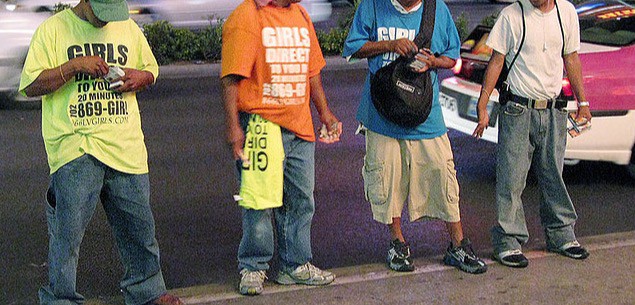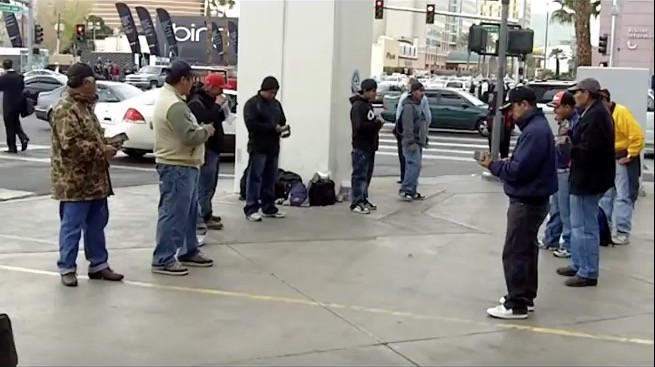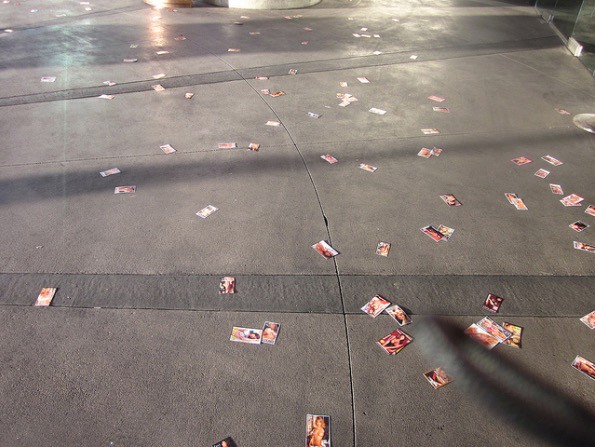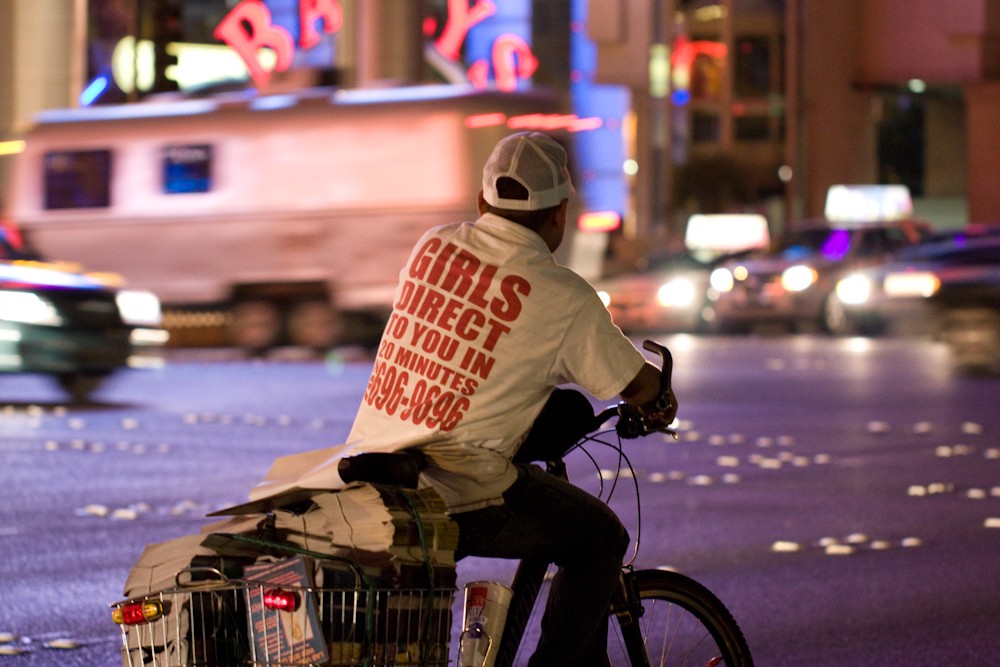The Curious Persistence of the Vegas Handbiller
by Mae Rice

When you walk down the Strip in Las Vegas, as roughly 18,000 people do every hour, here are some things you will notice: endless dinging, blooping, and victory noises coming from the casinos; dudes from the Midwest in aseasonal Mardi Gras beads; an ocean of neon; and people clustered on the sidewalk, handing out cards with topless women on them. In 2012, the last time I was in Vegas, these card-hawkers worked unsmilingly until well past midnight, slapping their top cards against their decks. Otherwise, they didn’t make a sound; in my decade-plus as a Vegas tourist, I’ve never heard them speak. The loudest thing about them, really, is their neon t-shirts, which say “GIRLS DIRECT TO YOU 20 MINUTES” in giant block letters.
These people, known as handbillers, advertise for Vegas escort services, or as officials call them, “outcall promoters.” “Outcall” means the businesses send their escorts (or, occasionally, strippers) on calls, rather than having customers come to them. “Promoter” means that they focus on advertising. Exhibit A: the cards handbillers hand out.
They are, just barely, not obscene, because the models’ nipples are obscured by Clip Art stars or glowing fog. They feature minimal text: a first name like “Tawny,” a phone number, a URL, a price under $100, and a few phrases like “full service” and “no hidden fees.” But $100 for what? What is “partial service”? I’ve never seen anyone ask a handbiller these questions. I’ve never seen anyone speak to a handbiller.
According to a Stephen Franklin piece that appeared in the Chicago Tribune, most handbillers are undocumented workers from Central and South America. One told Franklin that he received $40 for a 10-hour shift, paid in cash at the end of the night, with “no forms to fill out, and no questions asked.” Outcall promoters didn’t even seem to track their handbillers’ names, and the mystique was mutual; most handbillers didn’t know who they worked for.
“What else can I do?” a different handbiller asked Franklin. “I need [immigration] papers and I do not have any. I have three children here. […] We need money.”
In a world of cheap online ads, it’s odd that outcall promoters continue to pay for handbillers. Then again, I’m a modern Vegas tourist, and living proof that they still generate interest. In my quest to find out why they’re still fixtures of the Strip, I irritated stonewalling people, spoke with David Hasselhoff’s publicist, and called more than fifty outcall promoters. Handbillers clearly hooked me.

In the ’90s, Clark County banned handbillers. They were threats to public safety, and geysers of litter. Lieutenant Todd Raybuck, who has been involved in policing on the Strip for more than 20 years, said handbillers used to “form lines across the sidewalk, almost cordons or walls of individuals… probably the easiest way to describe it is a gauntlet.” To avoid them, some tourists would step into traffic. The ones who remained on the sidewalk were problematic, too. They would take handbillers’ cards blindly, then look at them and drop them in disgust, creating an issue the AP called “X-rated litter.”
Outcall promoters S.O.C. and Hillsboro Enterprises — owned by Richard Soranno and Vincent Bartello, respectively — fought the handbiller ban in court. Allen Lichtenstein, the ACLU general counsel at the time, assisted them, and explained the stakes of the case like this: If outcall promoters were trying to advertise in the pre-internet era, “their options were fairly limited.” They weren’t allowed to advertise in hotels, and “it took them years to get into the phone book, back when phone books were important.” They were fighting for their best available marketing strategy.

From a YouTube video titled ‘Las Vegas Card Snappers DURING THE DAY’
Overall, Vegas outcall promoters have remarkable luck with the law. Prostitution is illegal in Clark County, and the Las Vegas Police Department runs a steady stream of stings on escorts that rarely end well; a LVPD detective made a recent, general complaint that, while escort services claims they only offer private nude dances, they really “depend on prostitution as their main source of income.” Only the escorts themselves get punished for this, though. To work with outcall promoters, they sign independent contractor agreements, in which they promise not to solicit prostitution; this clears the promoters of responsibility if, or really when, prostitution takes place. (The legal system has helped the outcall industry in another way, too: In 1998, the FBI saved Soranno and Bartello from a New York mob assassin called Vinnie Aspirins, whose preferred weapon was the power drill.)
The handbiller case was no exception to the outcall promoters’ luck. The outcall promoters beat the ban. According to Lichtenstein, it was an overbroad ordinance to begin with. In an effort to get rid of handbillers who advertised for escorts, the county had in fact banned all “off-premises canvassing” in tourist centers; in other words, it had banned “handing out, on the public sidewalk, any material that had any advertising at all… even The New York Times,” Lichtenstein said. This meant he could beat the ordinance with a simple First Amendment argument. Sidewalks, he argued, are public forums, even when casinos own the land below them. Whatever people and businesses want to say on sidewalks, then — including “[pictures of boobs]” — is constitutionally protected speech.
After Lichtenstein and the outcall promoters’ initial success in court, revised versions of the ordinance continued to crop up for a decade. They were always struck down for the same First Amendment reasons as the first one, though. The law simply couldn’t beat handbilling, and so far, neither can the internet. I’ve heard, anecdotally, that there are fewer handbillers now than there were in the ’90s, but it’s hard to tell. Their headcount fluctuates with tourism. Whether it’s the peak season or not, though, you can always find handbillers on the Strip.

The information that handbillers hand out doesn’t help explain their presence. The URLS on their cards led me to websites full of full-frontal nudity, several of which looked like untouched artifacts from the ’90s. On one, the escort pictures were small and mugshot-like; on another, now updated, the stab at SEO was an unpunctuated swamp of keywords at the bottom of the page. The modern ones had design problems of their own. The higher-res pictures really showed the effort in the women’s expressions, the facial muscles holding up their flirty smiles. None of the sites mentioned handbillers.

So-called ‘X-rated litter’
The phone numbers on handbillers’ cards were similarly unhelpful, although they did lead me to one receptionist who was willing to talk. She explained that the escorts don’t just do nude dances; sometimes, at football events, they put on mini-jerseys and served hot dogs. She told me that if customers tipped generously enough, escorts might go the extra mile and, say, “put on a grass skirt and dance around.” She knew of two escorts whose clients had bought them Bentleys. As far as handbillers were concerned, though, she only knew that she wished their cards were more tasteful. “I get a lot of prank phone calls,” she said. “Teenage kids, they’re very explicit and rude to me.”
Luckily, there’s a way to reach outcall promoters without relying on their cards: an online government database, publicly accessible, that lists every licensed Vegas business. It’s obviously the product of bureaucracy, full of vaguely-named categories like “Personal Services” and “Retail — Group 1.” Looking through all the outcall promoters in the database (separated into two categories for no reason), I stumbled on some excellent business names: Adults Only!!!, Lipstixxx, T&A Entertainment, and my favorite, Bestkeptsecrets. In an on-brand turn of events, Bestkeptsecrets was one of two outcall promoters with no listed number.
When I started trying the numbers, a curt receptionist answered my first call; her company, Companions, didn’t use handbillers. After her, I kept making calls during business hours; still, I somehow reached a long string of voicemails. Often, they wouldn’t let me leave a message. “Try back later,” one said before the line went silent. “No routes found,” said another. The most frustrating one said “Leave a message,” but there was no follow-up beep.
The rare people who did answer hung up on me, told me I had a wrong number, or explained, sweetly, that they were “just a secretary.” If I asked the secretary to put me on with her manager, she — always she — reiterated that she was just a secretary.
Finally, though, an owner answered the phone himself. He told me that he only advertised online, and never used handbillers. Did I think he should, though? His business was losing money.
Like most outcall promoters, he described his business as a “referral service.” His income came from handling marketing for escorts, and matching them with clients. Outcall promoters usually do this in exchange for a “show-up fee” — the sum clients pay by phone to guarantee their escort shows up for her appointment. Escorts sometimes get a cut of this fee, but they’re paid primarily in tips.
The man was adamant that his escorts weren’t prostitutes. His company didn’t directly oversee them while they worked, but if he heard of an escort having sex with customers, he’d terminate her contract. “Maybe that’s part of the reason I’m not making any money,” he said. “I don’t know.”
I reached another owner, too, the only one who used a full name on his company voicemail: Albert Meranto. (While tracking down Meranto, I discovered a LinkedIn profile in his name, written almost entirely in scene and full of cameos from David Hasselhoff. An excerpt:
During the course of that first meeting [in 1996, at a nightclub Meranto ran], Mr. Hasselhoff said to Mr. Meranto: “Al, you have finer women here than we have on the beaches of Malibu”. When Mr. Meranto replied: “David, my girls are not only finer looking, but they love to play with “whales” and will swallow more than salt water”, an almost immediate bond was formed between them.
Meranto wouldn’t confirm he made the LinkedIn profile, but did say he knows David Hasselhoff; Hasselhoff’s publicist said he’d never heard of Meranto.)
Meranto’s been in the outcall industry for decades, and currently advertises through a mix of websites and paid referrals from cab drivers, limo drivers, and hotel concierges. When I asked him if he’d ever consider using handbillers, he said, “Never in a million years. That’s not my style of client… I wish they would stop that, because it degrades Vegas.”

I never reached Bartello, the owner of Hillsboro Enterprises. He’s one of handbillers’ primary, or at least best-documented, employers. If there’s a secret to handbillers’ longevity, besides that they make money, he’s most likely to know it. Not that his public persona suggests a man with secrets. On his Instagram, he clarifies that he’s kidding after each one of his jokes, tags pictures of his family with “#love,” and expresses enthusiasm for flashy cars, girls who go commando, and his own bare chest. His Instagram is a microcosm of Vegas, really — so much basicness and bravado, you can’t tell if there’s anything important underneath. You’re just always wondering. Keeping you wondering is the point.

Eventually, I reached a guy with something approaching a reason for handbillers’ longevity. He did outcall promoter marketing, but his company didn’t use handbillers. Instead, like Meranto’s businesses, they relied on paid referrals and websites.
Online advertising, this guy explained, isn’t as simple as it sounds. His company has about a hundred active websites. “We use different [ones] to target different keywords,” he explained. The sheer quantity of escort sites creates problems, though. It’s hard to get one surfaced by a search engine; in fact, the online landscape is so competitive that some escort sites have been using stripper keywords, even though escorts and strippers have different job. (Escorts do one-on-one work, while strippers only do group events.) This keyword overstepping has actual stripper services in a huff.

I asked him how the ancient-looking sites I’d encountered could exist in this climate. He said that they likely belong to Hillsboro Enterprises. “They’re terrible at web design,” he said. “Hillsboro, they’re a dinosaur. But they’re a powerful dinosaur. They do things the old school way.”
In other words, they advertise via handbiller. Maybe handbilling survives because it’s an escape from the SEO grind. It’s a way to avoid choosing between nearly-identical keywords like “Vegas escort” and “Vegas escorts” — two of the industry’s most hotly contested search terms, he said.
Handbilling also survives because Clark County made peace with it, finally. In 2011, officials abandoned the handbiller ban once and for all, and struck a “voluntary agreement” about handbiller conduct with the outcall promoters. As law, it would have been a First Amendment violation, but it was only law-adjacent. The Las Vegas Review-Journal recapped its main points:
Key rules of conduct include staying 20 feet away from crosswalks, not giving any material to people who look younger than 25, refraining from snapping the cards or pamphlets, whistling or making any other noise, picking up litter and handing out material to tourists’ torsos instead of their faces.
Modern handbillers are even less obtrusive than these rules make them sound, too, thanks to Clark County’s new No Obstruction Zones. Meant to prevent pedestrian traffic jams in tourist districts, they work a lot like no-parking zones, shifting from active to inactive based on pedestrian volume and the time of day. Lt. Raybuck, who helps police the Strip, said that handbillers who work in active zones can get anything from a verbal warning to fines and jail time. It’s an arrangement that can be read as a success. Handbillers are finally under control, from the county’s perspective, and Lt. Raybuck said he and his officers have encountered a few thirty-, forty-, and fifty-time violators of the No Obstruction Zone ordinance. Punishments can’t be too severe.
At the same time, the new agreements and laws create new ways for handbillers to irk the police, which reinforces a decades-old status quo. The outcall industry has always existed on the edge of legality, and its leaders have always outsourced its risks to escorts and handbillers, people with less clout and fewer options. People who will take it.
Photos by Daedrius and KayVee.INC
